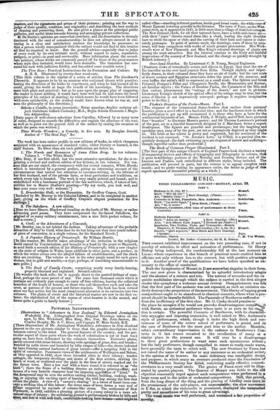MUSIC.
THIRD PHILHARMONIC CONCERT—MONDAY, APRIL !&
Pair
r.
Sinfoula in D, (Op. 87.) Yowl. Beth. " Wie hit mir " l Heri. Staudigl. (11") Spahr.
Air, " Bitider Thor I"
BetehoVen.
Reeeeineet.it°"LTnttfiate tr.ugean,.12duart""kairca,AnderamI(ra.,)
Baehr.
Air, " Si, lo Sento "
-Overture, Caulemire, (amt time of performance these-
Concerts) FMCS.
?AZT U.
SInfoula Pastorale Beethoven.
Recit. " Atlas ist richtig," I. Herr Btandlet, (Die t mozart. Arie " Ach abed Eure Angell," Hoehreit des Figaro.) I- Quartette, Two Violins, Viola, and Violoncello--Messrs. Blagrove, E. Thomas, Hill, and Lindley, (No. 2, Op. 18.) Mozart. -
Duette, " Quel sepolcro," Miss Birch and Herr Staudlgl,
(Agnese) Peer. Overture, Oberon. C. M. Von Went'.
Leader, Mr. Loder--Conductor, Sir H. R. Bishop.
Tars concert exhibited improvement on the two preceding ones, if not it novelty of selection, in effect and animation of performance. Sir Henry Bishop being indisposed, the conductorship fell at the last moment on Lucas; whose experience in this branch of practical music enabled him tte officiate not only without loss to the concert, but with positive advantaga to it. Another proof of the qualifications we have before specified as ne- cess‘ry to the office of conductor.
Both the Symphonies of Mozart in D areeomewhat singular in their form. The one now given is characterized by its splendid introductory adagio. and the absence of a minuet and trio. The torrent of sevenths and the ex quisite modulation through which the subject is carried in the first allegro. render this syniphony a welcome annual revival. Disappointment was felt that the first part of the andante was not repeated, as such an omission en-. tirely destroys the proportions of the movement. This liberty of lopping great compositions ought to be abandoned in classical concerts, where what is pro- mised should be literally fulfilled. The Pastorale of Beethoven suffered ir from the inefficiency of the first oboe. Mr. G. Cooke should practise zn, the place he occupies if he would not provoke disadvantageous oompirt4;rt with Barret, an orchestral performer whose taste is as pure as his ebcT0 tion is certain. The powerful Concerto of Beethoven, with its character- istic arpeggios and imposing crescendos, is well suited to Mrs. Anderson's style of performance, which, though it lacks the high finish and cor- rectness of some of the newer school of performers, is genial, and in the case of Beethoven for the most part true to the author. Mendels- sohn's extraordinary improvisation in the cadence to Beethoven's Con:- certo in G last season occurred to the recollection of many at a similar place in the present one. It will ever be a disadvantage to these great productions to want some such spontaneous tribute ; but the lady performers, thobgh compelled to resort to ready-made wares, have generally the taste to select well. The new Overture by Fes= has not raised the name of its author to any eminence as an orchestral writer,' in the opinion of its hearers. Its main deficiency was intelligible design and purpose; in which many an overture produced since the foundation of the Philharmonic Society has failed, restricting really effective concert- overtures to a very small circle.' The genius of Fesca must still be illus- trated by quartet-players. The Quartet of Mozart was liable to the old- objection reasonably urged against such compositions when performed in a large room and in the midst of orchestral compositions. Still, this proied, from the long disuse of the thing and the placing of Lindley once 'more in the prominence of the solo-player, not unacceptable: the slow movement in E fiat, in which the violoncello is prominent, displayed the unequalled purity and smoothness of his tone to great advantage. The vocal-music was well performed, and contained a fair proportion of novelty.


























 Previous page
Previous page